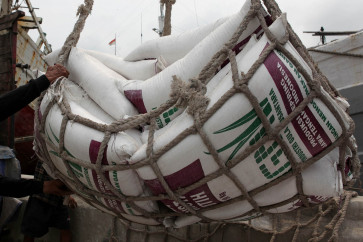Popular Reads
Top Results
Can't find what you're looking for?
View all search resultsPopular Reads
Top Results
Can't find what you're looking for?
View all search resultsNo breakthrough policies seen yet
âA desperate disease requires a dangerous remedyâ said English rebel Guy Fawkes over 400 years ago, after his arrest when he tried to blow up the Houses of Parliament
Change text size
Gift Premium Articles
to Anyone
'A desperate disease requires a dangerous remedy' said English rebel Guy Fawkes over 400 years ago, after his arrest when he tried to blow up the Houses of Parliament. The phrase urges the need for radical progress to resolve complicated public issues.
But the centuries old adage may not apply to the government's attempts to resolve the problems severely affecting the expansion of the national power grid.
At least 57.5 million people were still living without proper access to electricity as of 2012, according to the Energy and Mineral Resources Ministry.
This figure is equal to around 25 percent of households.
The ministry also revealed that the government has only managed to increase the electrification ratio by less than 3 percent to 75.83 percent in 2012 from 72.95 percent in 2011.
The ministry also admits in its 2013 plans that as of 2012, only the western part of Indonesia ' Sumatra, Java, Madura and Bali ' have an interconnected electricity system while the other parts remain isolated.
Despite of these failings, the government remains conservative in its approach to the issue by continuing with almost identical plans to previous years.
The government remains focused on completing of the first 10,000 megawatt (MW) power plant construction program followed by the second 10,000 MW phase. The programs were launched in 2006 and 2009, respectively.
Energy expert for the Reforminer think tank Komaidi Notonegoro believes there has been no breakthrough in policies, including how to accelerate the projects whose schedules have now been delayed for years.
'The first 10,000 MW project was launched in 2006 and there have been many regulations and revisions to support it, but as of now, it is only 30 to 40 percent complete,' Komaidi said recently.
'There is progress, but it's very slow progress,' he said.
According to the ministry, only around 46 percent of the first 10,000 MW project was complete as of 2012.
Energy and Mineral Resources Minister Jero Wacik said that the remainder of the project would be completed in 2013 through a fast track strategy. Exactly what this 'fast track strategy' will consist of, remains unclear.
As for the second 10,000 MW project, the ministry is still struggling to complete even the preparation, as most investors shied away from the projects for a variety of reasons, ranging from the pricing to even the accuracy of the governments assessment of geothermal resources.
Komaidi is pessimistic the government will complete its goal of adding 20,000 MW of electric supply by the 2020 unless there is a radical change within the administration.
'There is a need for more consistency in implementing the programs. To make things worse, there is a lack of coordination among officials,' Komaidi said.
Essential Services Reform energy expert Fabby Tumiwa argued that the two 10,000 MW programs were ineffective.
'The first program is definitely a failure. It was initially set to take place between 2006 and 2009, yet it actually began in 2009 and will probably be completed by 2015. Even if it is completed, we still have no idea whether the power plants will be able to operate fully for 20 years,' he said.
'The second one is no less complicated because it is set to use steam [from geothermal sources] to fuel the plants. Steam is only available in conservation areas so there will be a lot of regulatory overlap that need to be addressed,' he added.
Concern is widespread over short-term solutions based on a reactionary mind-set.
The initiative by then president director of state power company PT Perusahaan Listrik Negara (PLN) Dahlan Iskan between 2008 and 2009 to prevent blackouts by renting diesel plants is one example of a short-term remedy.
Out of concern over public criticism, Dahlan took an expensive short cut by plugging the power deficit by renting countless mobile diesel generators whose selling prices were far higher than regular power plants fueled by diesel, coal and gas.
While the policy was able to prevent blackouts in major cities, PLN had to endure exorbitant costs that eventually increased the subsidy allocation from the state budget.
Politicians have launched an investigation into the policy, suspicious at a lack of transparency and the possibility of graft.
'We need a fully comprehensive solution that covers all angles of the complicated electricity issues. The government should stop these partial solutions that do not solve anything,' Fabby said.
Despite the criticism, the Energy and Mineral Resources Ministry's director general for electricity, Jarman, said the government's priority would remain the completion of the 10,000 MW programs.
'We have signed a lot of service level agreements with numerous parties to accelerate the projects. For the time being, we will stick to that,' he said.
' JP/Hans David Tampubolon










